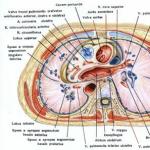Amnesia is a disease that manifests itself in incomplete or completely absent memories of past events. It can act as an isolated disorder (amnestic syndrome), or against the background of other disorders, such as aphasia, agnosia, apraxia.
2. What are the causes of amnesia?
There are many reasons for acute amnesia. It can be a consequence of a traumatic brain injury, or result from a stroke, herpetic encephalitis, metabolic encephalopathies, or intoxication. Degenerative brain disease, tumor, or mental illness can lead to gradually increasing amnesia. The causes of transient memory impairment are epilepsy, cerebrovascular accident, and migraine attacks.
3. What types of amnesia are there?
There are several types of amnesia, which differ in the nature and degree of memory loss:
1. Anterograde amnesia. All old memories are intact, but the patient does not remember anything after the onset of the disease.
2. Retrograde amnesia. Here everything is the other way around, all old memories are erased, but the patient perfectly remembers everything that happened to him after the onset of amnesia.
3. Paramnesia. With paramnesia, the patient remembers all events, but in an embellished form.
4. Psychogenic escape. With this dissociative disorder, the patient completely loses his identity, forgetting who he is and how he used to live.
5. Fixation amnesia. Memory for current (more than a few minutes) events is impaired. Fixation amnesia is a component of Korsakoff's syndrome.
6. Traumatic amnesia. Appears as a result of head injury (impact, fall on the head). In most cases it is temporary.
7. Korsakoff's syndrome. Severe anterograde and retrograde amnesia due to a lack of vitamin B1 in the brain, most often caused by alcoholism.
8. Childhood amnesia. The inability of all people to remember events in their lives dating back to infancy and early childhood. The probable reasons are the underdevelopment of the corresponding areas of the brain.
9. Post-hypnotic amnesia. Inability to remember what happened during hypnosis.
4. How is amnesia treated?
If amnesia does not progress, neuropsychological rehabilitation methods can be used in treatment. Medications prescribed include piracetam 2-4 g/day, gliatilin 400-800 mg 3 times a day, pyritinol (encephabol) 300-600 mg/day, Cerebrolysin 10-20 ml intravenously.
Psychotherapy and hypnosis are used in cases where amnesia is associated with psychological factors. As medicines in such cases, sodium pentothal or sodium amytal are used. With a concussion, there is a chance of gradual memory recovery, but severe damage can lead to permanent memory loss.
5. What are the ways to prevent amnesia?
Unfortunately, there are no ways to prevent amnesia. But you should know that timely treatment significantly speeds up the process of memory recovery. If physical trauma or emotional shock has occurred, seeking immediate medical attention will help reduce the likelihood of developing dissociative disorders.
6. Who treats amnesia?
If you have memory problems, you should contact a psychiatrist.
Amnesia is a disease characterized by the absence or incomplete memories of certain events.
Amnesia can be observed in old age against the background of natural degeneration of brain structures, or it can also occur in younger people, but for a number of other reasons.
Causes of amnesia
There are many causes of amnesia, but in some cases doctors are unable to determine why a person has memory loss.
The most common causes of amnesia are:
- disruption of the integrity of the brain due to traumatic brain injury, especially with damage to the temporal lobe;
- chronic lack of vitamin D in the body;
- intoxication, including various drugs (benzodiazepines, barbiturates);
- cerebrovascular accident;
- severe psychological trauma;
- alcoholism
- the effect of hypnosis on human consciousness;
- epilepsy;
- severe overwork, stress, increased emotional stress;
- stroke, herpetic encephalitis, neoplasms, metabolic encephalopathies, degeneration of brain tissue;
- migraine;
- schizophrenia;
- Alzheimer's disease;
- old age.
Types and symptoms of amnesia
There are different types of amnesia.
So, based on the time period that has fallen out of memory, they distinguish:
- retrograde amnesia. This type amnesia is associated with the loss of memories of events that preceded the disease;
- anterograde amnesia. In this case, memories of the period after leaving the unconscious state are lost. In this case, the patient does not remember recently occurring events and cannot assimilate new information;
- antetrograde amnesia, which is a combination of the two types of amnesia mentioned above;
- retarded amnesia, when memories are lost some time after a period of loss of consciousness.
According to the nature of development, they distinguish:
- regressive amnesia - amnesia, which is characterized by the restoration of lost memories.
- progressive amnesia. In this case, there is a gradual erasure of memories from the present moment to past events. The ability to remember new events is disrupted, memories are confused in time and lost, the emotional coloring of past events fades, and they are lost over time. At the same time, the events of childhood and adolescence, as well as professional skills and abilities, are clearly recalled.
- stationary amnesia - unchanging and persistent loss of memory for certain life events.
There are also types of amnesia such as:
- fixation amnesia, which is expressed in memory impairment for events that happened a few minutes ago. This type amnesia is typical for patients with Korsakoff's syndrome. In this case, the patient’s condition is not disturbed, but he does not orient himself in space and his personality, he can ask others about who he is, where he is, what’s wrong with him. The manifestation of amnesia symptoms can be paroxysmal, and the patient does not remember what happened during the attack. The disease may be accompanied by headaches, sensory disturbances, poor coordination of movements, cardiac arrhythmia;
- Posthypnotic amnesia occurs after hypnosis sessions. Patients do not remember what happened to them during the session;
- Post-traumatic amnesia is caused by concussion, head injuries, and most often goes away after appropriate treatment. Symptoms of post-traumatic amnesia are associated with a violation short term memory. The patient does not remember the events that immediately preceded the injury. The patient's memory is restored as he recovers;
- Korsakoff's syndrome - severe retrograde and anterograde amnesia that occurs due to a lack of vitamin B1 in the brain;
- childhood amnesia. Every person has this type of amnesia. This is due to the immaturity of certain areas of the brain in children;
- initial amnesia. In this case, having any information, a person does not remember from what source he received it;
- dissociative amnesia is associated with the fact that a person forgets periods of life or certain events, and may cease to recognize familiar words and speech patterns (aphasia), motor patterns (apraxia), objects (agnosia);
This type of amnesia is divided into:
localized amnesia - impairment of only one memory modality;
selective – when the patient remembers certain universal knowledge and forgets some events that occurred in a limited period of time;
generalized – when the patient forgets everything that happens in a limited period of time;
continuous - when the patient stops remembering new events;
- dissociative fugue is associated with the fact that the patient completely forgets his name, biography, and personal information. This type of amnesia can last for several minutes or several days. In this case, the patient forgets who he is or associates himself with a completely different person;
- Prosopamnesia is a poor ability to remember people's faces.
The condition after a concussion is characterized by the development of retrograde amnesia. For more severe injuries - antetrograde amnesia.
Korsakoff's syndrome is typically characterized by retrograde and fixation amnesia. Confabulations are possible. This condition is typical for malignant tumors, alcoholism, AIDS, vitamin B1 deficiency, degenerative dementia, and herpetic encephalitis.
In case of intoxication, events that occurred during poisoning with drugs, pesticides, alcohol, barbiturates, carbon monoxide, and benzodiazepines are forever erased from memory.
In the case of epilepsy, memory is lost for events that occurred during an epileptic attack.

Treatment of amnesia
The memory mechanism is very complex. Recovering erased memories poses a serious challenge.
The main areas of treatment for amnesia are:
- treatment of the underlying disease;
- neuropsychological rehabilitation.
In the drug treatment of amnesia, drugs that activate cholinergic processes in the brain are used, such as piracetam, gliatilin, encephabol, and cerebrolysin.
The dosage of drugs and the treatment regimen are selected by the doctor depending on the severity of amnesia.
In the treatment of amnesia, hypnosuggestive therapy is also used, which consists of putting the patient into a state of hypnosis, during which he recalls forgotten facts and events. Sometimes, in order for the patient to quickly remember certain facts, barbiturates may be administered to him.
Also in the treatment of amnesia, psychotherapeutic methods are used, for example, color therapy, which in some cases gives very good results. The essence of this psychotherapeutic technique comes down to the fact that each constitutional type has its own color. For patients with a “cold” constitution, use warm colors, for patients with a “hot” type of constitution - cool colors. The color effect is carried out either on the entire body of a patient with amnesia or only on the eyes.
Pathological processes can develop slowly with age or appear suddenly at one moment after injury. Amnesia sometimes indicates brain disease, so the sooner treatment is started, the better the prognosis. What amnesia is will be discussed below.
REASONS
The main causes of amnesia:
- Organic – injuries and diseases of the brain that provoke structural changes in the temporal lobes and poor circulation in this area. In addition, there is a negative impact of alcohol, drugs and medications.
- Psychological – have a psychogenic origin. The causes of such amnesia most often lie in severe emotional shocks, stress and psychological trauma.
Causes of complete or partial amnesia of organic origin:
- traumatic brain injuries sustained during a fall or hitting the head;
- consequences of concussion, epileptic attacks, acute migraine, hemorrhage and tumor formation;
- pathological disturbance of blood supply to the temporal lobes of the brain;
- intoxication with drugs (antidepressants, psychotropic drugs, sleeping pills), carbon monoxide, alcoholic drinks or salts of heavy metals;
- vitamin B1 deficiency due to alcoholism;
- consequences of inflammation of the meninges;
- accumulation of amyloid in brain structures (Alzheimer's disease).
SYMPTOMS
Experts point out that amnesia is an ambiguous condition that is characterized by varying degrees of memory loss and manifests itself in different ways. Depending on these signs, several types of pathology are distinguished.
Signs of different types of amnesia:

- Retrograde amnesia. The moments preceding the illness or injury are erased from memories. Most often, this condition occurs after a concussion. The disease does not affect memory of events following the injury.
- Anterograde. The patient cannot remember events after injury, stress or illness. Memories up to this point are fully preserved. There are cases of combined retrograde and anterograde amnesia.
- Traumatic amnesia is most often a temporary phenomenon and occurs as a consequence of traumatic brain injury.
- Fixation. Memory about some current and recent events is lost (memory lapses), while at the same time memories of the past do not suffer.
- Dissociated. Fundamental and professional knowledge remains, but some aspects of personal life are forgotten. Such disorders are characteristic of psychological stress.
- Korsakoff's syndrome. A severe form of memory loss occurring against the background of alcoholism and vitamin B1 deficiency.
- Dissociative fugue is a serious condition that is accompanied by complete amnesia. The patient forgets everything, even his name. This disorder can last for several hours or months.
Common symptoms of amnesia:
- memory loss over a period of time;
- difficulty remembering recent events and the names of others;
- confabulation, or false memories - the patient tries to replace forgotten episodes with fictitious events.
Signs accompanying memory loss:
- impaired coordination of movements;
- drowsiness;
- cardiac arrhythmia;
- confusion;
- loss of knowledge about subjects;
- visual impairment (double vision, eye tremors, paralysis of the eye muscles).
TREATMENT
Psychiatrists and neurologists treat amnesia. It is these specialists who should be contacted for help with such problems. During the conversation, the doctor finds out information about what events preceded the loss of memories.
Treatment goals:
- eliminating the causes of memory loss;
- restoration of brain function.
In case of traumatic, alcoholic, oncological amnesia or its other variety caused by a primary pathology, the emphasis is on treating the underlying disease.
The disease amnesia affects complex processes in the brain, so doctors face a difficult task when treating such conditions. Often the patient has to face failure when trying to recover lost memories.
The basis of the course of therapy is drug treatment. Choice medicines depends on the underlying disease. If necessary, diabetes, atherosclerosis, and hypertension are treated.
Medicines to treat amnesia:
- Nootropic drugs that improve the nutrition of brain cells and increase mental activity.
- Vasoactive drugs and aspirin-based antiplatelet agents affect blood thinning.
- Anticholinesterase drugs to stimulate autonomic nervous system in elderly patients.
- Memantines are intended to stop neurodegenerative processes in Alzheimer's disease.
- Antidepressants.
- Angioprotectors.
- Antioxidants.
- Biostimulants.
- B vitamins.
is a pathological loss of memories of current or past life circumstances. Included in the symptoms of neurological diseases, mental disorders, acute poisoning, chronic intoxication. The diagnostic process takes into account clinical data, the results of a neurological and mental examination, EEG, MRI, CT, blood biochemistry, and cerebrospinal fluid analysis. Treatment is carried out in accordance with the causative pathology, the main methods are psycho- and pharmacotherapy. If there is a tumor or hematoma, they are surgically removed.
ICD-10
R41.1 R41.2 R41.3

General information
Amnesia in Latin means unconsciousness. The absence of memories is not always a pathological condition. There is childhood amnesia - most people do not remember the events of the first 2-3 years of life. In the medical aspect, amnesia is considered as the loss of previously existing memories of significant life events, the inability to remember recent circumstances. Amnestic syndrome in combination with other symptoms appears integral part clinics for various neurological and psychiatric diseases. According to some estimates, about 25% of the world's population suffers from memory impairment. Along with amnesia, such disorders include qualitative mnestic disorders, characterized by a weakening of the ability to remember, difficulty in recalling.

Causes of amnesia
The etiofactors of amnestic syndrome are numerous and varied. In old age, the leading role in the etiology belongs to vascular disorders and degenerative processes. In young patients, traumatic and psychological factors. All causes of memory loss can be divided into two large groups: organic and psychological.
Organic causes lead to metabolic, morphological or bioelectrical changes in cerebral structures:
- Traumatic brain injury(severe concussion, brain contusion). Amnesia of events preceding the trauma is typical, and may be temporary.
- Brain tumors. The loss of memories is caused by compression and death of neurons.
- Cerebral hypoxia provokes disruption of interneuronal connections and death of nerve cells. Observed in cerebrovascular disorders (stroke, TIA), asphyxia, carbon monoxide poisoning, large blood loss, respiratory failure.
- Neuroinfections(neuroAIDS, tick-borne encephalitis, purulent meningitis) can occur with amnesia due to damage to cerebral tissue by infectious agents and inflammatory mediators.
- Intoxication. Amnesia occurs as a result of toxic brain damage. It is observed in cases of alcoholism, drug addiction, drug overdose, poisoning with solvents, and pesticides.
- Degenerative diseases of the central nervous system(Alzheimer's disease, vascular dementia, Pick's disease). The loss of mnestic functions is caused by demyelination, gliosis, and atrophy of brain tissue.
- Epilepsy. Memory loss extends throughout the period of the attack and is associated with loss of consciousness.
- Migraine. Amnestic symptoms are provoked by a disorder of cerebral hemodynamics that occurs during migraine paroxysm.
Psychological causes affect exclusively the human psyche and do not have a pathological effect on the brain:
- Psychological trauma(accident, death loved one, rape, kidnapping, terrorist attack, military action). Amnesia concerns traumatic events and is formed as a defensive reaction.
- Mental disorders. Memory loss is episodic. May be observed in schizophrenia, dissociative disorder, hysteria. Partial amnesia occurs after delirium.
Pathogenesis
The exact mechanism of development of amnesia is unknown. It is believed that the function of storing and reproducing information is carried out by cerebral neurons. The basis of mnestic disorders of organic origin is the destruction of interneuronal communications and neuronal dysfunction. A complete loss of information existing in the brain is possible, due to the death of the structural elements storing it. Psychogenic amnesia has a different formation mechanism. In the literature on neurology and psychiatry, authors explain it as a loss of the ability to recall certain information in memory. Selective loss of memory is typical separate group interconnected events that have a subjective internal meaning for the patient.
Classification
Amnesia is classified taking into account the etiology, volume, time characteristics of lost memories, and the development of emerging disorders. According to the completeness of memory loss, it happens:
- Complete – absolute loss of memories for a certain period of the past.
- Partial – there are vague images, fragments of memories.
- Local – selective amnesia of a particular skill. Characteristic of psychogenic memory disorders.
Depending on the time of the forgotten events in relation to the moment of the onset of memory problems, the following types of amnesia exist:
- Retrograde – lack of memory for events that took place before the onset of the disorder.
- Anterograde – impaired memory of circumstances that occurred after the onset of the disease.
- Anteroretrograde - is a combination of the first two forms.
- Fixation – loss of memory for what is happening at the moment. May last for several minutes.
According to the type of flow, the following options are distinguished:
- Regressive – memories are gradually restored.
- Stationary – the memory state remains without dynamics.
- Progressive - amnesia worsens, events of the present and the increasingly distant past are erased from memory.
Symptoms of amnesia
The basic symptom is the inability to remember the circumstances that happened. The loss of memories concerns a certain time period in the patient’s life. The sequence is described by Ribot's law: first, what happened recently is forgotten, then the facts of the immediate past, then more recent events. Memory recovery occurs in the reverse order. Sometimes confabulations are noted - fictitious memories with which the patient tries to fill the gaps in memory. The amnestic symptom complex is observed in combination with other manifestations characteristic of the underlying disease.
Post-stroke amnesia is combined with hypomnesia (a general decrease in memory for present events), paramnesia (confusion of circumstances of the past and present), speech disorders, and motor deficits. Amnesia, which is part of the psychoorganic syndrome, manifests itself against the background of cognitive disorders: decreased ability to assimilate information, decreased attentiveness, slowness of thinking. Dissociative memory loss is accompanied by absent-mindedness, affective states and vagrancy are possible. Transient global amnesia is characterized by transient episodes up to the point of disorientation of the patient. Combination various types amnesia is characteristic of Korsakoff's syndrome.
Inpatient disorder is difficult for patients and provokes the formation of a false sense of guilt and the development of depression. Progressive amnesia leads to loss of ability to work. Patients forget the way home and are unable to navigate previously familiar terrain. Acquired knowledge and skills disappear from memory. Subsequently, disorientation in time and in one’s own personality is observed. The patient requires constant care.
Diagnostics
The diagnostic algorithm is individual, compiled in accordance with the clinical picture of the disease. Implemented by a consulting neurologist with the involvement, if necessary, of a psychiatrist, narcologist, infectious disease specialist, and neurosurgeon. The diagnostic plan includes:
- History taking. A thorough questioning about the events preceding the disease and manifestations of the disease is carried out with the involvement of the patient’s relatives.
- Assessment of neurological status. Makes it possible to identify signs of organic disease of the central nervous system and determine the degree of post-traumatic changes.
- Mental status assessment. A comprehensive psychological examination is necessary for patients with psychogenic amnesia and mental disorders.
- Cerebral hemodynamic studies. They are carried out if a vascular genesis of memory disorders is suspected. The simplest method is rheoencephalography, more informative is ultrasound of the vessels of the head, duplex scanning, MRI of blood vessels.
- Visualization of brain structures. CT scan of the brain is prescribed for patients with TBI or intracranial hematoma. Cerebral MRI is effective in diagnosing tumors, degenerative processes, and post-stroke lesions.
- Electroencephalography. Performed on patients with symptoms of epilepsy. EEG allows you to diagnose paroxysmal brain activity and determine its nature.
- Biochemical blood test. According to indications, the level of vitamin B1 and toxic substances is determined, and a drug test is performed.
- Cerebrospinal fluid examination. It is carried out when an infectious etiology or intracranial hemorrhage is suspected.
Treatment of amnesia
Therapy is selected according to the etiology and symptoms of the underlying disease. For organic amnesia, predominantly drug treatment is used, for psychogenic amnesia, psychotherapeutic treatment is used. In pharmacotherapy of organic forms the following are used:
- Vascular agents(vasodilators, antiplatelet agents) – improve cerebral blood flow and tissue nutrition.
- Neuroprotectorsand antioxidants– optimize the metabolism of neurons, increase their resistance to hypoxia and adverse effects.
- Anticholinesterase pharmaceuticals– inhibit the progression of dementia in old age, increase daily activity.
- Memantines– improve mnestic functions. Effective in the treatment of Alzheimer's disease.
- Nootropics– stimulate cognitive abilities, activate the metabolism of cerebral tissues.
Additionally, psychotherapeutic techniques are used aimed at adapting the patient to the presence of gaps in memories. In some cases, hypnotherapy is used to remember the past. The presence of a cerebral tumor, hematoma, or crush site is an indication for treatment through neurosurgical intervention.
Treatment of psychogenic forms is not aimed at restoring lost memories, but at the patient’s acceptance of the fact of their absence. Therapy is carried out by a psychiatrist and includes:
- Psychotherapy. Through cognitive behavioral therapy, a new attitude towards memory problems is achieved. Dissociated amnesia caused by family conflict requires family psychotherapy. In the presence of childhood psychotrauma, psychoanalysis is used, allowing the patient to reconsider his attitude towards what happened.
- Creative treatment. Suitable for patients who are not inclined to demonstrate their feelings and thoughts. Carried out through fairy tale therapy, art therapy, etc.
- Drug therapy. It is necessary as an addition to psychotherapy in patients with anxiety, depression, restlessness, and mental disorders. An individual selection of drugs from the following groups is made: antidepressants, sedatives, antipsychotics.
Prognosis and prevention
The course and outcome of the pathology are closely related to the etiofactor, underlying disease, and age of the patient. Post-traumatic amnesia is usually reversible. Amnesia due to degenerative changes in the central nervous system has a steadily progressive course. Psychogenic disorder is prone to partial regression as a result of therapy. At a young age, memory is restored better than in older people. Prevention of amnestic syndrome includes the prevention of head injuries, infections, intoxications, traumatic effects, correct and timely treatment of migraines, epilepsy, and vascular disorders.
Amnesia is a disease associated with partial or complete loss of memory, both spontaneous and temporary, and long-term and permanent. Memory can return in chronological order or according to the principle of the most vivid memories.
Causes and symptoms of amnesia
The causes of amnesia are of two main types - organic and psychological. Organic causes are associated with injuries, diseases of the brain and nervous system, alcoholism, drug addiction, as well as the effects of antidepressants, sleeping pills and psychotropic substances.
Psychological causes of the disease are psychogenic in nature and are usually associated with mental trauma and stress.
The causes of amnesia can be traumatic brain injury, encephalitis, stroke and intoxication, as well as suffocation, poisoning with poisonous gases, ischemia and hypoxia.
If the disease is gradually increasing in nature, then it may be associated with pathological disorders and degenerative processes in the brain, the development of tumors and the manifestation of mental illness. Short-term memory loss often occurs due to cerebrovascular accidents, epilepsy attacks and acute migraines.
Amnesia can have both independent symptoms and those combined with other diseases. Symptoms of amnesia usually include sudden or gradual memory loss, confusion, lack of coordination, loss of orientation in time and space, and inability to recognize people. Symptoms of amnesia may take minutes, hours, or years to appear.
Long-term amnesia leads to complete loss of memory and disorientation, but with proper treatment the patient can make a full recovery.
Often the cause of acute amnesia is severe alcohol dependence. In this case, Wernicke's syndrome manifests itself, which is accompanied by acute confusion, impaired brain function and lack of self-identification.
Symptoms of amnesia with Wernicke's syndrome include drowsiness, visual and hearing problems, poor coordination, muscle spasms, and paralysis.
Types of amnesia
Currently, there are several main types of amnesia in medicine:
- anterograde with loss of the ability to remember events and people;
- retrograde with absence of memories before the onset of the disease;
- traumatic, which occurred after injury, fall and blow;
- fixation with memory impairment for several minutes;
- dissociated, which is a consequence of mental trauma;
- Korsakoff's syndrome, which occurs in a severe form with long-term memory loss due to alcoholism;
- localized with a violation of one or more memory modalities, associated with lesions of certain parts of the brain and combined with loss of memory for words, motor skills and object recognition;
- selective with memory loss for a specific event of a mental and stressful nature;
- dissociative with severe consequences and complete loss of the patient’s memory of his personality and biography;
- children's, associated with birth and age-related trauma, experiences, stress, as well as slowed or stopped development of parts of the brain.
Treatment of amnesia
 In the first periods of development of the disease and in the absence of progression, treatment of amnesia is carried out using neuropsychological methods of rehabilitation of patients. The therapy includes medications that enhance the functioning of the brain, such as piracetam, Semax, encephabol, gliacytin, etc.
In the first periods of development of the disease and in the absence of progression, treatment of amnesia is carried out using neuropsychological methods of rehabilitation of patients. The therapy includes medications that enhance the functioning of the brain, such as piracetam, Semax, encephabol, gliacytin, etc.
If the disease is traumatic in nature, then therapy is aimed at treating the main consequences of physical trauma.
When amnesia is combined with Wernicke's syndrome, an intravenous course of thiamine is prescribed to restore brain function. Treatment is urgent, since the disease in an advanced stage often leads to death.
Effective treatment for amnesia psychological type consists of conducting hypnosis sessions, prescribing psychotherapy, as well as a course of antipsychotic medications.
Video from YouTube on the topic of the article:





